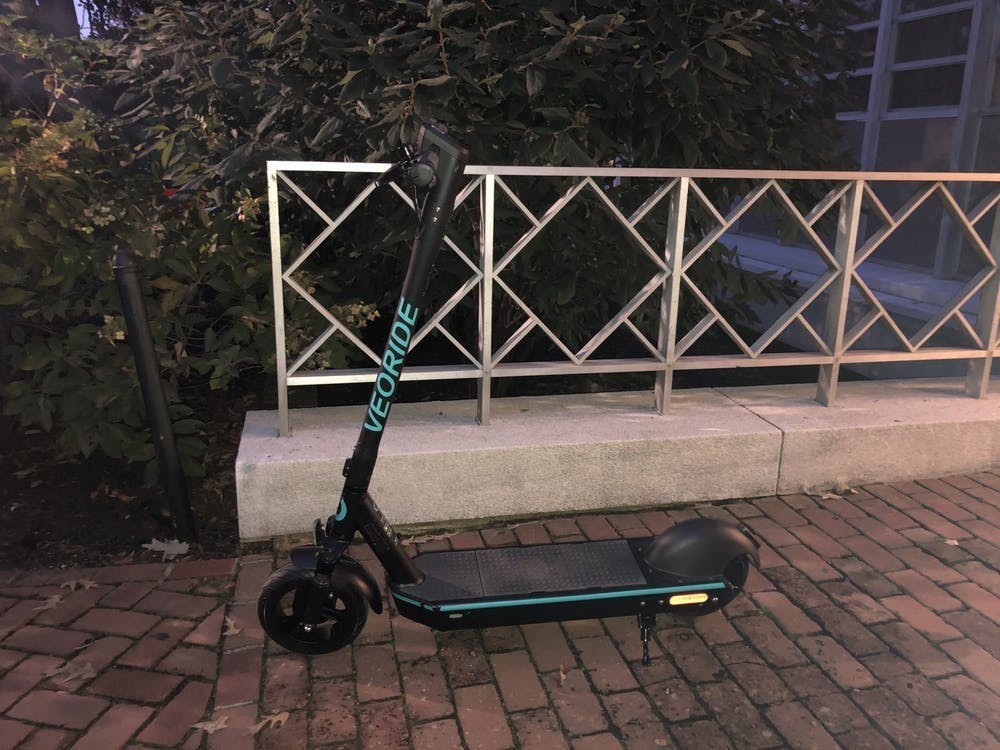If you take a walk through or around Grounds, you will inevitably encounter dockless electric scooters, whether they’re whizzing past you or left on a sidewalk waiting for another rider. According to the mission of VeoRide — the company that provides these scooters — the devices are meant to “establish micro-mobility as a true transportation system to reduce automotive use and promote widespread utilization of shared alternative mobility in a safe and reliable way.” Many students regard VeoRide scooters as a convenient form of transportation, and their appeal is obvious. If a student is running late to class, they only need to take out their phone, find a VeoRide on a nearby sidewalk and promptly ride it to their destination, where they can quickly drop it off wherever they would like to stop. Herein lies a major issue with VeoRide scooters — as any pedestrian who has had to step over or maneuver past a scooter left on a busy sidewalk could tell you, what one rider deems a convenient drop-off location often proves inconvenient for others. VeoRide scooters are too often found haphazardly strewn on sidewalks and bike lanes across Charlottesville.
There are regulations in place meant to remedy this. For example, as The Daily Progress mentions, “riders are required to operate the devices as ‘close as practicable to the right curb or edge of the roadway,’ except when turning, passing or avoiding hazards. They cannot be parked on sidewalks, except the back edge, on streets or obstruct curb ramps, pedestrian access within bus stops or fire access. A fine of up to $50 could be imposed for incorrect parking.” Additionally, a “geofencing” feature sets virtual boundaries for the e-scooters in certain areas, within which one cannot be parked. Despite these policies, however, issues with parking dockless electric scooters continue to persist — to the chagrin of many pedestrians and bikers in Charlottesville. On Twitter, one can find numerous Veoride-related complaints with disgruntled residents sharing images of scooters posting scooters left in inconvenient spaces and posing dangers to pedestrians. One user, for example, posted a photo showing four scooters cluttering a sidewalk on the Corner, providing an impediment to wheelchair access on the sidewalk. Another post features a scooter obstructing the walkway highlighting similar accessibility issues. On numerous occasions, users have reported unattended scooters blocking Charlottesville’s bike lanes. It’s easy to imagine how this could pose a risk for bicyclists.
Surely, some would be happy to see the scooters gone altogether. However, there are elements of VeoRide e-scooters that are worth reconciling. If we are to keep them around, though, some reforms are undoubtedly needed.
One effective solution would be to install proper docks — doubling as recharging stations — for the scooters. This would not only benefit pedestrians, bikers and people with disabilities, but would also be convenient for VeoRide users since, as Quemuel Arroyo notes in StreetsBlog NYC, docks allow users to “know exactly where to locate e-scooters and [not] have to worry about whether the devices are sufficiently charged.” Docks would also benefit the environment, since docklessness comes with environmental costs that aren’t apparent at the point of use. When being driven, e-scooters do not contribute to carbon emissions, but dockless scooters do need to be recharged — which usually entails fossil-fuel consuming automobiles collecting the devices when they are low on power and redistributing them after recharging. A study done at North Carolina State University suggests that due to this factor, e-scooters “do not necessarily reduce environmental impacts from the transportation system.”
So, perhaps, as one University community member has pointed out on Twitter, “docklessness is the problem, not the solution.” Recharging docks — which would make VeoRide e-scooters a safer, more sustainable and more reliable form of transportation — seems to be precisely what is needed to allow e-scooters to live up to their full potential.
Robert McCoy is an Opinion Columnist for The Cavalier Daily. He can be reached at opinion@cavalierdaily.com.
The opinions expressed in this column are not necessarily those of The Cavalier Daily. Columns represent the views of the authors alone.







